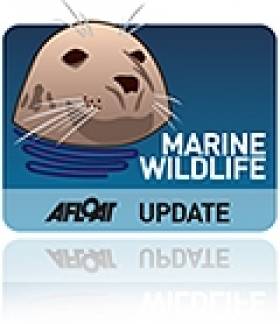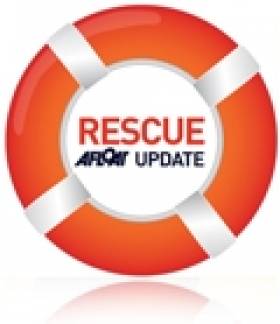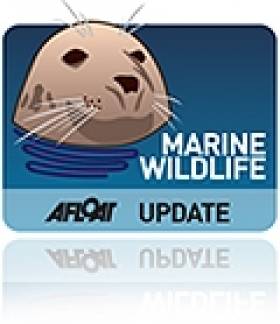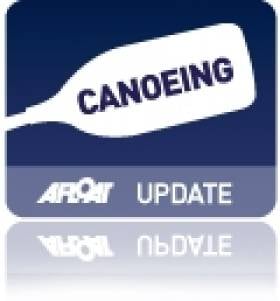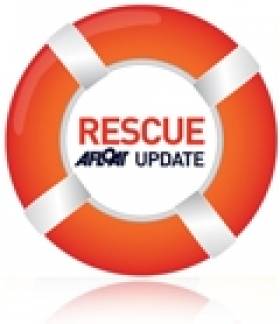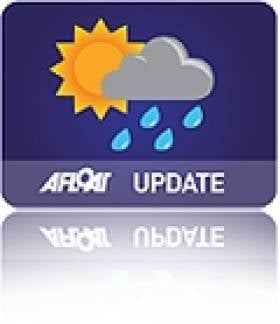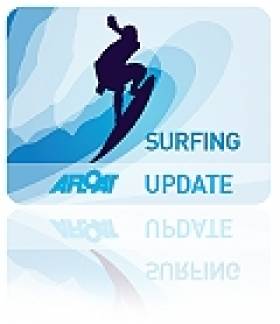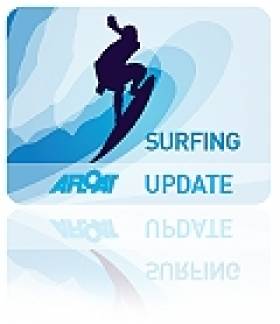Displaying items by tag: Donegal
Dancing Dolphins Surprise Researchers Off Donegal
#MARINE WILDLIFE - Marine researchers off the coast of Donegal were recently treated to a rare dolphin dance by a 50-strong pod, as IrishCentral reports.
The video above captures the same pod witnessed by researchers with the Irish Basking Shark Project, who were in the area off Inishowen to observe basking sharks in the coastal waters when they were surprised by the gregarious dolphin congregation.
A spokesperson for the project confirmed to IrishCentral that such large groupings of dolphins are unusual for the area, which has welcomed more than its fair share of large marine wildlife over recent months.
As previously reported on Afloat.ie, one of the first confirmed sightings of killer whales on the Irish coastline was recorded earlier this summer when a family of orcas from the Scottish Hebrides visited the same waters at the mouth of Lough Swilly.
Meanwhile, WorldIrish reports on the heartwarming tale of a Dutch couple who have bonded with Dingle's most famous non-human resident, Fungie the dolphin.
Jeannine Masset and Rudi Schamhart, who now live in Annascaul, have visited the friendly cetacean for 21 years, and their connection has inspired a fanpage on Facebook that has received responses from Fungie fans around the world.
"Fungie has enriched our lives and we want to give something back to him by offering our friendship and companionship to him," said Jeannine, "and he lets us know over and over again that he really appreciates it."
Rescuers Guided to Donegal Swimmer By Woman With Binoculars
#RESCUE - The Irish Times reports on the rescue of a swimmer in distress off the Donegal coast thanks to the help of a woman with binoculars.
And the RNLI has paid tribute to the Malin Head coastguard unit for its knowledge of the area which was instrumental to the postive turn-out.
The man had been swimming off Five Fingers strand in Inishowen on Friday afternoon when he was washed out more than one-and-a-half miles into the sea.
The Malin Head unit of the Irish Coast Guard immediately co-ordinated the rescue effort, which saw both the Sligo coastguard helicopter and Lough Swilly RNLI lifeboat dispatched to the scene.
In an echo of June's 'miracle rescue' of a man in Cork Harbour after he was spotted by telescope, rescuers were assisted by a woman with an elevated view on the shore who spotted the swimmer and guided them to his location.
The man was quickly airlifted to Altnagelvin Hospital in Derry for treatment. He was said to be very traumatised after the incident.
“The outcome could have been different but for the local knowledge these guys have,” said Lough Swilly lifeboat spokesman Joe Joyce.
As previously reported on Afloat.ie, the coastguard radio stations at Malin Head and Valentia are both under threat of closure following a 'value for money' review of the State's marine rescue services.
Algal Bloom Killing Fish, Shellfish Off West Coast
#MARINE WILDLIFE - An algal bloom off the west coast of Ireland is responsible for significant fish and shellfish kills from Galway to Donegal, according to the Marine Institute.
As The Irish Times reports, as much as 80% of stocks have been affected on Donegal oyster farms, and the bloom is also impacting negatively on angling tourism in the west and northwest.
The algae responsible, karenia mikimotai, occurs naturally in Ireland's coastal waters during the summer months and his harmless to humans, but contains a "toxic irritant" that damages the gills of fish, shellfish and other marine species.
Low-level samples were first detected in May but in the last two weeks it has grown into a dense bloom from Donegal to Mayo, with high levels now being recorded in Galway Bay, according to the Marine Institute's Joe Silke.
"In Donegal the bloom was so dense that there were many reports of discoloured red or brown water in some areas and several areas have reported dead marine life washing up on the shoreline, requiring local authorities to close certain beaches,” he said.
"The bloom affects species that live on or near the sea bed so we are seeing flatfish, lugworms and some shellfish getting washed up on the beaches."
The image evokes memories of the notorious 'red tide' that killed wild fish and shellfish along the west coast in 2005.
Meanwhile, the Marine Insitute said there are "some indications" that the bloom may be moving back out to sea, as observed in the latest satellite images and modelling data.
"However, cell counts of samples analysed in the Marine Institute... show that the bloom is still of the same density in the Donegal and Sligo regions as it was last week."
Donegal Marine Stakeholders Encouraged Over Integration Plan
#NEWS UPDATE - A Donegal TD is encouraging the county's marine stakeholders to submit suggestions for the Government's upcoming Integrated Marine Plan, as previously reported on Afloat.ie.
The plan, which will be published in the summer, "will be a national agenda for developing our country’s marine potential, across tourism, shipping, leisure, fisheries and other sectors," said Joe McHugh TD.
The Dáil deputy noted "it is significant" that Taoiseach Enda Kenny and Minister for the Marine Simon Coveney are "dealing with this personally" as "previous Governments did not give this type of prioritisation to the industry".
He added: “I encourage Donegal marine stakeholders who see potential for national development in the fisheries industry, sea tourism, marine leisure, oil production, renewable energy production, deep sea fisheries and in various other areas to make submissions to the Integrated Marine Plan."
More information on the Integrated Marine Plan can be found at www.oceanwealth.ie.
Father-Son Duo in Charity Paddle from Dublin to Donegal
#KAYAKING - A father-and-son duo from north Co Dublin will shortly embark on an epic kayak paddle from Dublin to Donegal, the Fingal Independent reports.
Dermot Higgins and his son Fionn, from Rush, will attempt to kayak from Dublin Port to the Atlantic Ocean at Ballyshannon - a distance of some 330km - by way of the Royal Canal, the River Shannon and Lough Erne.
The Higgins' - who believe they are the first to attempt such a feat - will be completely self-sufficuent for the duration of the challenge, which is hoped to raised funds for the Rush Open Organisation for Transition Status (ROOTS), a charity that intends to help communities reduce their carbon footprint and face up to environmental challenges by encouraging sustainability.
The Fingal Independent has more on the story HERE.
Donegal Skipper's Dramatic Alaska Rescue Story
#RESCUE - A Donegal-born skipper joined in the dramatic rescue of a fishing trawler crew in Alaska recently, the Donegal Democrat reports.
Seamus Hayden Jr, who captains the fishing vessel Clyde, was berthed in Lazy Bay at the southern end of the Kodiak peninsula when he responded to a call from fellow vessel the Tuxedni to assist the stricken Heritage, which was sinking a mile east of nearby Tanner Head.
“I rousted my crew and fired our main engine to join the Tuxedni in the search," he said. "I did not know at that time if the Heritage crew had abandoned ship.
“I informed everyone onboard my vessel to dress for extreme weather and to use utmost caution and a buddy system at all times around the vessel."
Visibility was low due to ice fog and the darkness of the Alaskan winter nights, and as they got closer to the Heritage's location - where the US Coast Guard was attemping a helicopter rescue - conditions were "horrendous", with ice-cold winds of 60 knots.
I was very worried for the safety of all involved, including our own," said Hayden.
The Donegal Democrat has much more on the story HERE.
Ireland Battered by Storm-Force Winds
#WEATHER - Ireland has been warned to brace for further strong winds set to sweep across the country today (4 January),
The Irish Times reports. Winds reaching near hurricane speeds have affected coastal communities in the north and northwest, peaking at a remarkable 168km/h in Donegal.
Thousands of euro worth of damage was caused when the roofs of traditional thatched cottages at Cruit Island in west Donegal were blown away.
But the west and east have also been hard hit, with storm-force gales exceeding 100km/h uprooting trees and disrupting electricity supply.
As previously reported on Afloat.ie, ferry services on the east coast have been severely affected. Irish Ferries cancelled two fast ferries from Dublin to Holyhead yesterday, and today's early Jonathan Swift sailings between Dublin and Holyhead were also cancelled.
Met Éireann expects wind speeds to be lower today, but could still reach 90-120km/h in some areas.
The Irish Times has much more on the story HERE.
'World's Biggest Waves' Off Irish Coast?
#SURFING - One of Ireland's top surfers claims he has found the world's biggest waves off the coast of Ireland.
As Irish Central reports, Portrush waverider Al Mennie says that he and surfing partner Andrew Cotton have found two waves reaching as much as 120 feet in secret locations off the coasts of Antrim and Donegal.
The duo are currently waiting for the right conditions to surf the biggest swells.
"The good days are few and far between – 90 percent of the swells are unrideable and we'd reckon that only two days each year are rideable," Mennie told the Irish Independent.
Their location is being kept under wraps for now due to safety concerns, as the waves crash down in a hazardous rocky area - making them definitely not suitable for novices.
Irish Central has more on the story HERE.
Body of Irish Fisherman Recovered in Scotland
#NEWS UPDATE - A fisherman whose body was found in a Scottish harbour on St Stephen's Day has been identified as that of a 34-year-old Donegal man, the Belfast Telegraph reports.
Philip Anthony Toland, from Glengad in Inishowen, Co Donegal, was last seen on Christmas Day near the pier at Ullapool harbour in the Scottish Highlands.
As BBC News reports, concerns were raised later that evening and a search was launched involving police, coastguard and RNLI lifeboat teams.
The body was located by a police dive team in the sea near the pier when the search resumed on Monday morning.
It is being speculated that Toland - who has an eight-year-old son - may have slipped and fallen into the water while returning to his boat.
Cornish Surfer Rides Ireland's Record Biggest Wave
#SURFING - British surfer Jayce Robinson wasn't about to let the largest wave ever recorded off Ireland's shores go by without giving it a shot.
And as Sky News Online reports, he was captured doing exactly that on Tuesday afternoon.
The Cornish surfing pro told the website: "It was definitely the biggest barrell I've ever surfed.
"I was a little nervous but I didn't have time to think about it - it's almost like a car crash, you don't know what's happening."
Robinson rode the giant wave for 20 seconds before the lip crashed down and knocked him off his board.
His surfing partner Lyndon Wake, who towed him to the swell at Mullaghmore Head, said: "It's always a worst case scenario when your tow partner wipes out. Lucky he managed to come out the other side OK."
As previously reported on Afloat.ie, storm force winds off the coast of Donegal produced monster rollers of over 20 metres (over 60 feet) in height detected in Donegal Bay.
Mullaghmore Head will once again welcome the world's top big wave surfers for the second annual Tow-In Surf Session in the New Year.



























